- Home
- William Shakespeare
On Power (Penguin) Page 3
On Power (Penguin) Read online
Page 3
More bitterly could I expostulate,
Save that for reverence to some alive
I give a sparing limit to my tongue.
Then, good my lord, take to your royal self
This proffered benefit of dignity,
If not to bless us and the land withal,
Yet to draw forth your noble ancestry
From the corruption of abusing times
Unto a lineal, true-derived course.
MAYOR (to Richard):
Do, good my lord. Your citizens entreat you.
BUCKINGHAM (to Richard):
Refuse not, mighty lord, this proffered love.
CATESBY (to Richard):
O make them joyful. Grant their lawful suit.
RICHARD GLOUCESTER:
Alas, why would you heap this care on me?
I am unfit for state and majesty.
I do beseech you, take it not amiss,
I cannot, nor I will not, yield to you.
BUCKINGHAM:
If you refuse it, as, in love and zeal,
Loath to depose the child, your brother’s son,
As well we know your tenderness of heart
And gentle, kind, effeminate remorse,
Which we have noted in you to your kindred,
And equally indeed to all estates,
Yet know, whe’er you accept our suit or no,
Your brother’s son shall never reign our king;
But we will plant some other in the throne,
To the disgrace and downfall of your house.
And in this resolution here we leave you.
Come, citizens. ’Swounds, I’ll entreat no more.
RICHARD GLOUCESTER:
O do not swear, my lord of Buckingham.
Exeunt Buckingham and some others.
CATESBY:
Call him again, sweet prince. Accept their suit.
(ANOTHER):
If you deny them, all the land will rue it.
RICHARD GLOUCESTER:
Will you enforce me to a world of cares?
Call them again.
Exit one or more.
I am not made of stone,
But penetrable to your kind entreats,
Albeit against my conscience and my soul.
Enter Buckingham and the rest.
Cousin of Buckingham, and sage, grave men,
Since you will buckle fortune on my back,
To bear her burden, whe’er I will or no,
I must have patience to endure the load.
But if black scandal or foul-faced reproach
Attend the sequel of your imposition,
Your mere enforcement shall acquittance me
From all the impure blots and stains thereof.
For God doth know, and you may partly see,
How far I am from the desire of this.
MAYOR:
God bless your grace! We see it and will say it.
RICHARD GLOUCESTER:
In saying so you shall but say the truth.
BUCKINGHAM:
Then I salute you with this royal title:
Long live kind Richard, England’s worthy king!
(ALL BUT RICHARD):
Amen.
Troilus and Cressida, Act I, Scene 3
ULYSSES:
Troy, yet upon his basis, had been down
And the great Hector’s sword had lacked a master
But for these instances:
The specialty of rule hath been neglected,
And look how many Grecian tents do stand
Hollow upon this plain: so many hollow factions.
When that the general is not like the hive
To whom the foragers shall all repair,
What honey is expected? Degree being vizarded,
Th’unworthiest shows as fairly in the masque
[…]
The heavens themselves, the planets, and this centre,
Observe degree, priority, and place,
Infixture, course, proportion, season, form,
Office and custom, in all line of order.
And therefore is the glorious planet Sol,
In noble eminence enthroned and sphered
Amidst the other, whose med’cinable eye
Corrects the ill aspects of planets evil
And posts like the commandment of a king,
Sans check, to good and bad. But when the planets
In evil mixture to disorder wander,
What plagues and what portents, what mutiny?
What raging of the sea, shaking of earth?
Commotion in the winds, frights, changes, horrors
Divert and crack, rend and deracinate
The unity and married calm of states
Quite from their fixture. O when degree is shaked,
Which is the ladder to all high designs,
The enterprise is sick. How could communities,
Degrees in schools, and brotherhoods in cities,
Peaceful commerce from dividable shores,
The primogenity and due of birth,
Prerogative of age, crowns, sceptres, laurels,
But by degree stand in authentic place?
Take but degree away, untune that string,
And hark what discord follows. Each thing meets
In mere oppugnancy. The bounded waters
Should lift their bosoms higher than the shores
And make a sop of all this solid globe;
Strength should be lord of imbecility,
And the rude son should strike his father dead.
Force should be right; or rather, right and wrong,
Between whose endless jar justice resides,
Should lose their names, and so should justice too,
Then everything includes itself in power:
Power into will, will into appetite,
And appetite, an universal wolf,
So doubly seconded with will and power,
Must make perforce an universal prey,
And last eat up himself. Great Agamemnon,
This chaos, when degree is suffocate,
Follows the choking;
And this neglection of degree it is,
That by a pace goes backward in a purpose
It hath to climb. The general’s disdained
By him one step below; he, by the next;
That next, by him beneath. So every step,
Exampled by the first pace that is sick
Of his superior, grows to an envious fever
Of pale and bloodless emulation.
And ’tis this fever that keeps Troy on foot,
Not her own sinews. To end a tale of length:
Troy in our weakness lives, not in her strength.
Henry IV, Part II, Act III, Scene 1
KING HENRY:
How many thousand of my poorest subjects
Are at this hour asleep? O sleep, O gentle sleep,
Nature’s soft nurse, how have I frighted thee
That thou no more wilt weigh my eyelids down
And steep my senses in forgetfulness?
Why rather, sleep, liest thou in smoky cribs,
Upon uneasy pallets stretching thee,
And hushed with buzzing night-flies to thy slumber,
Than in the perfumed chambers of the great,
Under the canopies of costly state
And lulled with sound of sweetest melody?
O thou dull god, why li’st thou with the vile
In loathsome beds, and leav’st the kingly couch
A watch-case, or a common ’larum-bell?
Wilt thou upon the high and giddy mast
Seal up the ship-boy’s eyes, and rock his brains
In cradle of the rude imperious surge,
And in the visitation of the winds,
Who take the ruffian billows by the top,
Curling their monstrous heads and hanging them
With deafing clamour in the slippery clouds,
That,
with the hurly, death itself awakes?
Canst thou, O partial sleep, give thy repose
To the wet sea-boy in an hour so rude,
And in the calmest and most stillest night,
With all appliances and means to boot,
Deny it to a king? Then happy low, lie down.
Uneasy lies the head that wears a crown.
Power in the family
The Merchant of Venice, Act III, Scene 2
PORTIA:
You see me, Lord Bassanio, where I stand,
Such as I am. Though for myself alone
I would not be ambitious in my wish
To wish myself much better, yet for you
I would be trebled twenty times myself,
A thousand times more fair, ten thousand times more rich,
That only to stand high in your account
I might in virtues, beauties, livings, friends,
Exceed account. But the full sum of me
Is sum of something which, to term in gross
Is an unlessoned girl, unschooled, unpractised,
Happy in this, she is not yet so old
But she may learn; happier than this,
She is not bred so dull but she can learn;
Happiest of all is that her gentle spirit
Commits itself to yours to be directed
As from her lord, her governor, her king.
Myself and what is mine to you and yours
Is now converted. But now I was the lord
Of this fair mansion, master of my servants,
Queen o’er myself; and even now, but now,
This house, these servants, and this same myself
Are yours, my lord’s. I give them with this ring,
Which when you part from, lose, or give away,
Let it presage the ruin of your love,
And be my vantage to exclaim on you.
King Lear, Act I, Scene 1
LEAR:
Meantime we shall express our darker purpose.
Give me the map there. Know that we have divided
In three our kingdom, and ’tis our fast intent
To shake all cares and business from our age,
Conferring them on younger strengths while we
Unburdened crawl toward death. Our son of Cornwall,
And you, our no less loving son of Albany,
We have this hour a constant will to publish
Our daughters’ several dowers, that future strife
May be prevented now. The princes France and Burgundy –
Great rivals in our youngest daughter’s love –
Long in our court have made their amorous sojourn,
And here are to be answered. Tell me, my daughters,
Since now we will divest us both of rule,
Interest of territory, cares of state,
Which of you shall we say doth love us most,
That we our largest bounty may extend
Where nature doth with merit challenge? Goneril,
Our eldest born, speak first.
GONERIL:
Sir, I love you more than words can wield the matter,
Dearer than eyesight, space, and liberty,
Beyond what can be valued, rich or rare,
No less than life, with grace, health, beauty, honour,
As much as child e’er loved or father found,
A love that makes breath poor and speech unable;
Beyond all manner of so much I love you.
CORDELIA (aside):
What shall Cordelia speak? Love and be silent.
LEAR (to Goneril):
Of all these bounds even from this line to this,
With shadowy forests and with champaigns riched,
With plenteous rivers and wide-skirted meads,
We make thee lady. To thine and Albany’s issues
Be this perpetual. What says our second daughter?
Our dearest Regan, wife of Cornwall?
REGAN:
I am made of that self mettle as my sister,
And prize me at her worth. In my true heart
I find she names my very deed of love;
Only she comes too short, that I profess
Myself an enemy to all other joys,
Which the most precious square of sense possesses,
And find I am alone felicitate
In your dear highness’ love.
CORDELIA (aside):
Then, poor Cordelia,
And yet not so, since I am sure my love’s
More ponderous than my tongue.
LEAR (to Regan):
To thee and thine hereditary ever
Remain this ample third of our fair kingdom,
No less in space, validity, and pleasure
Than that conferred on Goneril. (to Cordelia) Now our joy,
Although our last and least, to whose young love
The vines of France and milk of Burgundy
Strive to be interessed: what can you say to draw
A third more opulent than your sisters? Speak.
CORDELIA:
Nothing, my lord.
LEAR:
Nothing?
CORDELIA:
Nothing.
LEAR:
Nothing will come of nothing.
Henry IV, Part II, Act II, Scene 3
LADY PERCY:
O yet, for God’s sake, go not to these wars!
The time was, father, that you broke your word
When you were more endeared to it than now,
When your own Percy, when my heart’s dear Harry,
Threw many a northward look to see his father
Bring up his powers; but he did long in vain.
Who then persuaded you to stay at home?
There were two honours lost, yours and your son’s.
For yours, the God of heaven brighten it!
For his, it stuck upon him as the sun
In the grey vault of heaven, and by his light
Did all the chivalry of England move
To do brave acts. He was indeed the glass
Wherein the noble youth did dress themselves.
He had no legs that practised not his gait;
And speaking thick, which nature made him blemish,
Became the accents of the valiant.
For those that could speak low and tardily
Would turn their own perfection to abuse
To seem like him. So that in speech, in gait,
In diet, in affections of delight,
In military rules, humours of blood,
He was the mark and glass, copy and book,
That fashioned others. And him, O wondrous him!
O miracle of men! Him did you leave,
Second to none, unseconded by you,
To look upon the hideous god of war
In disadvantage, to abide a field
Where nothing but the sound of Hotspur’s name
Did seem defensible; so you left him.
Never, O never do his ghost the wrong
To hold your honour more precise and nice
With others than with him. Let them alone.
The Marshal and the Archbishop are strong.
Had my sweet Harry had but half their numbers,
Today might I, hanging on Hotspur’s neck,
Have talked of Monmouth’s grave.
NORTHUMBERLAND:
Beshrew your heart,
Fair daughter, you do draw my spirits from me
With new lamenting ancient oversights.
Richard III, Act IV, Scene 4
QUEEN MARGARET:
I called thee then ‘vain flourish of my fortune’,
I called thee then, poor shadow, ‘painted queen’,
The presentation of but what I was,
The flattering index of a direful pageant,
One heaved a-high to be hurled down below,
A mother only mocked with two fair babes,
A
dream of what thou wast, a garish flag
To be the aim of every dangerous shot,
A sign of dignity, a breath, a bubble,
A queen in jest, only to fill the scene.
Where is thy husband now? Where be thy brothers?
Where are thy two sons? Wherein dost thou joy?
Who sues, and kneels, and says ‘God save the Queen’?
Where be the bending peers that flattered thee?
Where be the thronging troops that followed thee?
Decline all this and see what now thou art:
For happy wife, a most distressed widow;
For joyful mother, one that wails the name;
For queen, a very caitiff, crowned with care;
For one being sued to, one that humbly sues;
For she that scorned at me, now scorned of me;
For she being feared of all, now fearing one;
For she commanding all, obeyed of none.
Thus hath the course of justice whirled about
And left thee but a very prey to time,
Having no more but thought of what thou wert
To torture thee the more, being what thou art.
Thou didst usurp my place, and dost thou not
Usurp the just proportion of my sorrow?
Now thy proud neck bears half my burdened yoke,
From which, even here, I slip my weary head,
And leave the burden of it all on thee.
Farewell, York’s wife, and queen of sad mischance.
A Midsummer Night’s Dream, Act I, Scene 1
EGEUS:
Full of vexation come I, with complaint
Against my child, my daughter Hermia.
Stand forth Demetrius. My noble lord,
This man hath my consent to marry her.
Stand forth Lysander. And, my gracious Duke,
This hath bewitched the bosom of my child.
Thou, thou, Lysander, thou hast given her rhymes
And interchanged love tokens with my child.
Thou hast by moonlight at her window sung
With feigning voice verses of feigning love,
And stol’n the impression of her fantasy
With bracelets of thy hair, rings, gauds, conceits,
Knacks, trifles, nosegays, sweetmeats; messengers
Of strong prevailment in unhardened youth.
With cunning hast thou filched my daughter’s heart,
Turned her obedience which is due to me
Save that for reverence to some alive
I give a sparing limit to my tongue.
Then, good my lord, take to your royal self
This proffered benefit of dignity,
If not to bless us and the land withal,
Yet to draw forth your noble ancestry
From the corruption of abusing times
Unto a lineal, true-derived course.
MAYOR (to Richard):
Do, good my lord. Your citizens entreat you.
BUCKINGHAM (to Richard):
Refuse not, mighty lord, this proffered love.
CATESBY (to Richard):
O make them joyful. Grant their lawful suit.
RICHARD GLOUCESTER:
Alas, why would you heap this care on me?
I am unfit for state and majesty.
I do beseech you, take it not amiss,
I cannot, nor I will not, yield to you.
BUCKINGHAM:
If you refuse it, as, in love and zeal,
Loath to depose the child, your brother’s son,
As well we know your tenderness of heart
And gentle, kind, effeminate remorse,
Which we have noted in you to your kindred,
And equally indeed to all estates,
Yet know, whe’er you accept our suit or no,
Your brother’s son shall never reign our king;
But we will plant some other in the throne,
To the disgrace and downfall of your house.
And in this resolution here we leave you.
Come, citizens. ’Swounds, I’ll entreat no more.
RICHARD GLOUCESTER:
O do not swear, my lord of Buckingham.
Exeunt Buckingham and some others.
CATESBY:
Call him again, sweet prince. Accept their suit.
(ANOTHER):
If you deny them, all the land will rue it.
RICHARD GLOUCESTER:
Will you enforce me to a world of cares?
Call them again.
Exit one or more.
I am not made of stone,
But penetrable to your kind entreats,
Albeit against my conscience and my soul.
Enter Buckingham and the rest.
Cousin of Buckingham, and sage, grave men,
Since you will buckle fortune on my back,
To bear her burden, whe’er I will or no,
I must have patience to endure the load.
But if black scandal or foul-faced reproach
Attend the sequel of your imposition,
Your mere enforcement shall acquittance me
From all the impure blots and stains thereof.
For God doth know, and you may partly see,
How far I am from the desire of this.
MAYOR:
God bless your grace! We see it and will say it.
RICHARD GLOUCESTER:
In saying so you shall but say the truth.
BUCKINGHAM:
Then I salute you with this royal title:
Long live kind Richard, England’s worthy king!
(ALL BUT RICHARD):
Amen.
Troilus and Cressida, Act I, Scene 3
ULYSSES:
Troy, yet upon his basis, had been down
And the great Hector’s sword had lacked a master
But for these instances:
The specialty of rule hath been neglected,
And look how many Grecian tents do stand
Hollow upon this plain: so many hollow factions.
When that the general is not like the hive
To whom the foragers shall all repair,
What honey is expected? Degree being vizarded,
Th’unworthiest shows as fairly in the masque
[…]
The heavens themselves, the planets, and this centre,
Observe degree, priority, and place,
Infixture, course, proportion, season, form,
Office and custom, in all line of order.
And therefore is the glorious planet Sol,
In noble eminence enthroned and sphered
Amidst the other, whose med’cinable eye
Corrects the ill aspects of planets evil
And posts like the commandment of a king,
Sans check, to good and bad. But when the planets
In evil mixture to disorder wander,
What plagues and what portents, what mutiny?
What raging of the sea, shaking of earth?
Commotion in the winds, frights, changes, horrors
Divert and crack, rend and deracinate
The unity and married calm of states
Quite from their fixture. O when degree is shaked,
Which is the ladder to all high designs,
The enterprise is sick. How could communities,
Degrees in schools, and brotherhoods in cities,
Peaceful commerce from dividable shores,
The primogenity and due of birth,
Prerogative of age, crowns, sceptres, laurels,
But by degree stand in authentic place?
Take but degree away, untune that string,
And hark what discord follows. Each thing meets
In mere oppugnancy. The bounded waters
Should lift their bosoms higher than the shores
And make a sop of all this solid globe;
Strength should be lord of imbecility,
And the rude son should strike his father dead.
Force should be right; or rather, right and wrong,
Between whose endless jar justice resides,
Should lose their names, and so should justice too,
Then everything includes itself in power:
Power into will, will into appetite,
And appetite, an universal wolf,
So doubly seconded with will and power,
Must make perforce an universal prey,
And last eat up himself. Great Agamemnon,
This chaos, when degree is suffocate,
Follows the choking;
And this neglection of degree it is,
That by a pace goes backward in a purpose
It hath to climb. The general’s disdained
By him one step below; he, by the next;
That next, by him beneath. So every step,
Exampled by the first pace that is sick
Of his superior, grows to an envious fever
Of pale and bloodless emulation.
And ’tis this fever that keeps Troy on foot,
Not her own sinews. To end a tale of length:
Troy in our weakness lives, not in her strength.
Henry IV, Part II, Act III, Scene 1
KING HENRY:
How many thousand of my poorest subjects
Are at this hour asleep? O sleep, O gentle sleep,
Nature’s soft nurse, how have I frighted thee
That thou no more wilt weigh my eyelids down
And steep my senses in forgetfulness?
Why rather, sleep, liest thou in smoky cribs,
Upon uneasy pallets stretching thee,
And hushed with buzzing night-flies to thy slumber,
Than in the perfumed chambers of the great,
Under the canopies of costly state
And lulled with sound of sweetest melody?
O thou dull god, why li’st thou with the vile
In loathsome beds, and leav’st the kingly couch
A watch-case, or a common ’larum-bell?
Wilt thou upon the high and giddy mast
Seal up the ship-boy’s eyes, and rock his brains
In cradle of the rude imperious surge,
And in the visitation of the winds,
Who take the ruffian billows by the top,
Curling their monstrous heads and hanging them
With deafing clamour in the slippery clouds,
That,
with the hurly, death itself awakes?
Canst thou, O partial sleep, give thy repose
To the wet sea-boy in an hour so rude,
And in the calmest and most stillest night,
With all appliances and means to boot,
Deny it to a king? Then happy low, lie down.
Uneasy lies the head that wears a crown.
Power in the family
The Merchant of Venice, Act III, Scene 2
PORTIA:
You see me, Lord Bassanio, where I stand,
Such as I am. Though for myself alone
I would not be ambitious in my wish
To wish myself much better, yet for you
I would be trebled twenty times myself,
A thousand times more fair, ten thousand times more rich,
That only to stand high in your account
I might in virtues, beauties, livings, friends,
Exceed account. But the full sum of me
Is sum of something which, to term in gross
Is an unlessoned girl, unschooled, unpractised,
Happy in this, she is not yet so old
But she may learn; happier than this,
She is not bred so dull but she can learn;
Happiest of all is that her gentle spirit
Commits itself to yours to be directed
As from her lord, her governor, her king.
Myself and what is mine to you and yours
Is now converted. But now I was the lord
Of this fair mansion, master of my servants,
Queen o’er myself; and even now, but now,
This house, these servants, and this same myself
Are yours, my lord’s. I give them with this ring,
Which when you part from, lose, or give away,
Let it presage the ruin of your love,
And be my vantage to exclaim on you.
King Lear, Act I, Scene 1
LEAR:
Meantime we shall express our darker purpose.
Give me the map there. Know that we have divided
In three our kingdom, and ’tis our fast intent
To shake all cares and business from our age,
Conferring them on younger strengths while we
Unburdened crawl toward death. Our son of Cornwall,
And you, our no less loving son of Albany,
We have this hour a constant will to publish
Our daughters’ several dowers, that future strife
May be prevented now. The princes France and Burgundy –
Great rivals in our youngest daughter’s love –
Long in our court have made their amorous sojourn,
And here are to be answered. Tell me, my daughters,
Since now we will divest us both of rule,
Interest of territory, cares of state,
Which of you shall we say doth love us most,
That we our largest bounty may extend
Where nature doth with merit challenge? Goneril,
Our eldest born, speak first.
GONERIL:
Sir, I love you more than words can wield the matter,
Dearer than eyesight, space, and liberty,
Beyond what can be valued, rich or rare,
No less than life, with grace, health, beauty, honour,
As much as child e’er loved or father found,
A love that makes breath poor and speech unable;
Beyond all manner of so much I love you.
CORDELIA (aside):
What shall Cordelia speak? Love and be silent.
LEAR (to Goneril):
Of all these bounds even from this line to this,
With shadowy forests and with champaigns riched,
With plenteous rivers and wide-skirted meads,
We make thee lady. To thine and Albany’s issues
Be this perpetual. What says our second daughter?
Our dearest Regan, wife of Cornwall?
REGAN:
I am made of that self mettle as my sister,
And prize me at her worth. In my true heart
I find she names my very deed of love;
Only she comes too short, that I profess
Myself an enemy to all other joys,
Which the most precious square of sense possesses,
And find I am alone felicitate
In your dear highness’ love.
CORDELIA (aside):
Then, poor Cordelia,
And yet not so, since I am sure my love’s
More ponderous than my tongue.
LEAR (to Regan):
To thee and thine hereditary ever
Remain this ample third of our fair kingdom,
No less in space, validity, and pleasure
Than that conferred on Goneril. (to Cordelia) Now our joy,
Although our last and least, to whose young love
The vines of France and milk of Burgundy
Strive to be interessed: what can you say to draw
A third more opulent than your sisters? Speak.
CORDELIA:
Nothing, my lord.
LEAR:
Nothing?
CORDELIA:
Nothing.
LEAR:
Nothing will come of nothing.
Henry IV, Part II, Act II, Scene 3
LADY PERCY:
O yet, for God’s sake, go not to these wars!
The time was, father, that you broke your word
When you were more endeared to it than now,
When your own Percy, when my heart’s dear Harry,
Threw many a northward look to see his father
Bring up his powers; but he did long in vain.
Who then persuaded you to stay at home?
There were two honours lost, yours and your son’s.
For yours, the God of heaven brighten it!
For his, it stuck upon him as the sun
In the grey vault of heaven, and by his light
Did all the chivalry of England move
To do brave acts. He was indeed the glass
Wherein the noble youth did dress themselves.
He had no legs that practised not his gait;
And speaking thick, which nature made him blemish,
Became the accents of the valiant.
For those that could speak low and tardily
Would turn their own perfection to abuse
To seem like him. So that in speech, in gait,
In diet, in affections of delight,
In military rules, humours of blood,
He was the mark and glass, copy and book,
That fashioned others. And him, O wondrous him!
O miracle of men! Him did you leave,
Second to none, unseconded by you,
To look upon the hideous god of war
In disadvantage, to abide a field
Where nothing but the sound of Hotspur’s name
Did seem defensible; so you left him.
Never, O never do his ghost the wrong
To hold your honour more precise and nice
With others than with him. Let them alone.
The Marshal and the Archbishop are strong.
Had my sweet Harry had but half their numbers,
Today might I, hanging on Hotspur’s neck,
Have talked of Monmouth’s grave.
NORTHUMBERLAND:
Beshrew your heart,
Fair daughter, you do draw my spirits from me
With new lamenting ancient oversights.
Richard III, Act IV, Scene 4
QUEEN MARGARET:
I called thee then ‘vain flourish of my fortune’,
I called thee then, poor shadow, ‘painted queen’,
The presentation of but what I was,
The flattering index of a direful pageant,
One heaved a-high to be hurled down below,
A mother only mocked with two fair babes,
A
dream of what thou wast, a garish flag
To be the aim of every dangerous shot,
A sign of dignity, a breath, a bubble,
A queen in jest, only to fill the scene.
Where is thy husband now? Where be thy brothers?
Where are thy two sons? Wherein dost thou joy?
Who sues, and kneels, and says ‘God save the Queen’?
Where be the bending peers that flattered thee?
Where be the thronging troops that followed thee?
Decline all this and see what now thou art:
For happy wife, a most distressed widow;
For joyful mother, one that wails the name;
For queen, a very caitiff, crowned with care;
For one being sued to, one that humbly sues;
For she that scorned at me, now scorned of me;
For she being feared of all, now fearing one;
For she commanding all, obeyed of none.
Thus hath the course of justice whirled about
And left thee but a very prey to time,
Having no more but thought of what thou wert
To torture thee the more, being what thou art.
Thou didst usurp my place, and dost thou not
Usurp the just proportion of my sorrow?
Now thy proud neck bears half my burdened yoke,
From which, even here, I slip my weary head,
And leave the burden of it all on thee.
Farewell, York’s wife, and queen of sad mischance.
A Midsummer Night’s Dream, Act I, Scene 1
EGEUS:
Full of vexation come I, with complaint
Against my child, my daughter Hermia.
Stand forth Demetrius. My noble lord,
This man hath my consent to marry her.
Stand forth Lysander. And, my gracious Duke,
This hath bewitched the bosom of my child.
Thou, thou, Lysander, thou hast given her rhymes
And interchanged love tokens with my child.
Thou hast by moonlight at her window sung
With feigning voice verses of feigning love,
And stol’n the impression of her fantasy
With bracelets of thy hair, rings, gauds, conceits,
Knacks, trifles, nosegays, sweetmeats; messengers
Of strong prevailment in unhardened youth.
With cunning hast thou filched my daughter’s heart,
Turned her obedience which is due to me

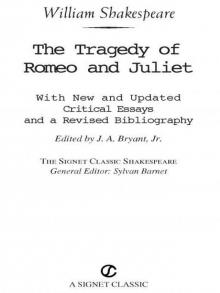 Romeo and Juliet
Romeo and Juliet As You Like It (Folger Shakespeare Library)
As You Like It (Folger Shakespeare Library)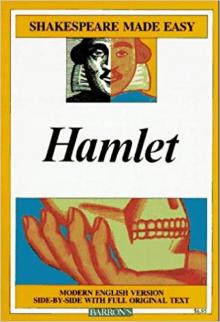 Hamlet
Hamlet Richard II (Folger Shakespeare Library)
Richard II (Folger Shakespeare Library) Macbeth
Macbeth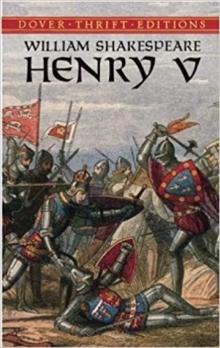 Henry V
Henry V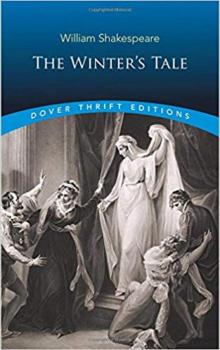 The Winter's Tale
The Winter's Tale The Taming of the Shrew
The Taming of the Shrew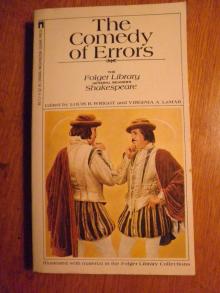 The Comedy of Errors
The Comedy of Errors King Lear (Folger Shakespeare Library)
King Lear (Folger Shakespeare Library)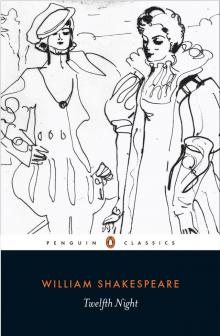 Twelfth Night
Twelfth Night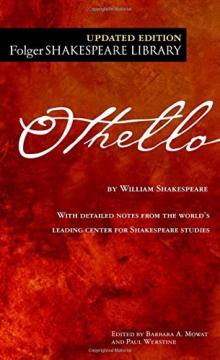 Othello
Othello The Two Gentlemen of Verona
The Two Gentlemen of Verona Henry IV, Part 1 (Folger Shakespeare Library)
Henry IV, Part 1 (Folger Shakespeare Library)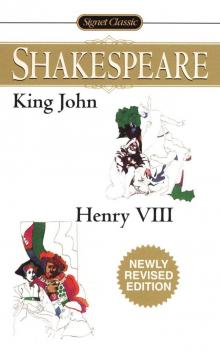 King John/Henry VIII (Signet Classics)
King John/Henry VIII (Signet Classics)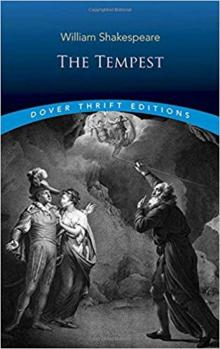 The Tempest
The Tempest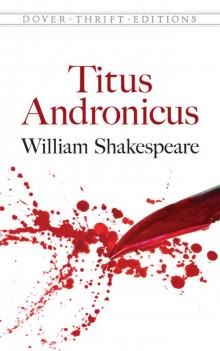 Titus Andronicus (Dover Publications)
Titus Andronicus (Dover Publications)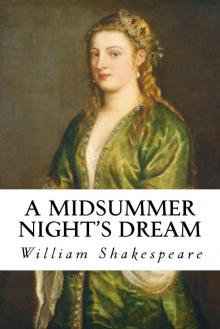 A Midsummer Night's Dream
A Midsummer Night's Dream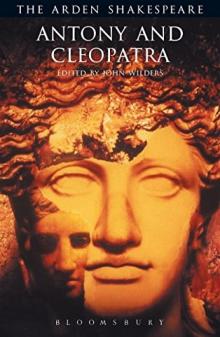 Antony and Cleopatra (Arden Shakespeare: Third Series)
Antony and Cleopatra (Arden Shakespeare: Third Series)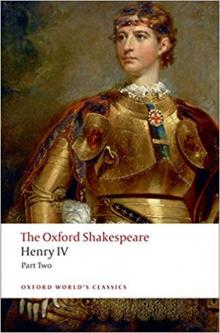 The Oxford Shakespeare: Henry IV, Part 2 (Oxford World's Classics)
The Oxford Shakespeare: Henry IV, Part 2 (Oxford World's Classics)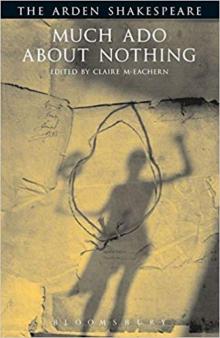 Much Ado About Nothing (Arden Shakespeare: Third Series)
Much Ado About Nothing (Arden Shakespeare: Third Series) All's Well That Ends Well
All's Well That Ends Well Titus Andronicus & Timon of Athens
Titus Andronicus & Timon of Athens Richard III (Modern Library Classics)
Richard III (Modern Library Classics) Coriolanus
Coriolanus srsly Hamlet (OMG Shakespeare)
srsly Hamlet (OMG Shakespeare)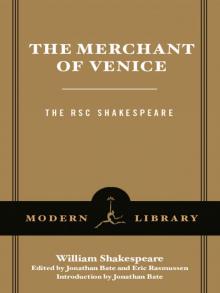 The Merchant of Venice
The Merchant of Venice Richard III
Richard III Richard II
Richard II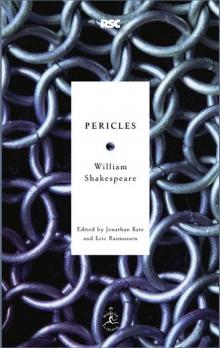 Pericles
Pericles As You Like It
As You Like It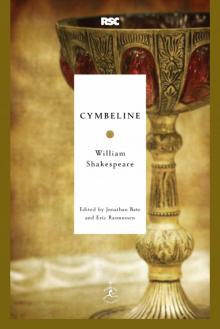 Cymbeline
Cymbeline Alls Wel that ends Well
Alls Wel that ends Well YOLO Juliet
YOLO Juliet A Midsummer Night #nofilter
A Midsummer Night #nofilter Love's Labour's Lost
Love's Labour's Lost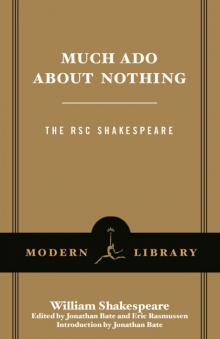 Much Ado About Nothing
Much Ado About Nothing Romeo & Juliet & Vampires
Romeo & Juliet & Vampires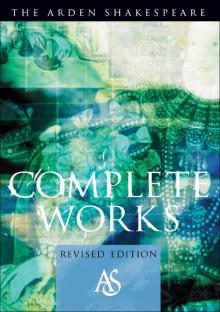 The Arden Shakespeare Complete Works
The Arden Shakespeare Complete Works Julius Caesar
Julius Caesar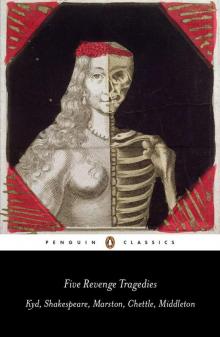 Five Revenge Tragedies: The Spanish Tragedy, Hamlet, Antonio's Revenge, The Tragedy of Hoffman, The Revenger's Tragedy (Penguin Classics)
Five Revenge Tragedies: The Spanish Tragedy, Hamlet, Antonio's Revenge, The Tragedy of Hoffman, The Revenger's Tragedy (Penguin Classics) Macbeth #killingit
Macbeth #killingit The Oxford Shakespeare: The Complete Works
The Oxford Shakespeare: The Complete Works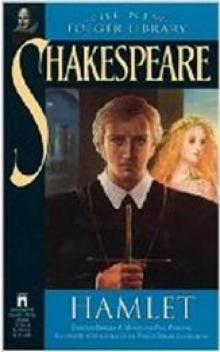 Hamlet, Prince of Denmark (Collins edition)
Hamlet, Prince of Denmark (Collins edition) King John & Henry VIII
King John & Henry VIII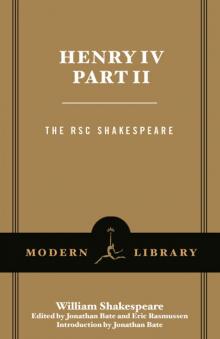 Henry IV, Part 2
Henry IV, Part 2 Complete Plays, The
Complete Plays, The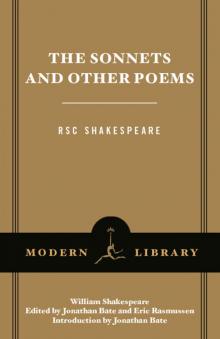 The Sonnets and Other Poems
The Sonnets and Other Poems Antony and Cleopatra
Antony and Cleopatra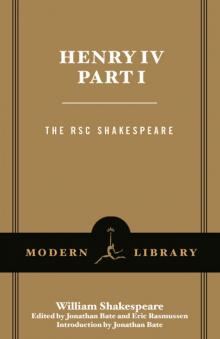 Henry IV, Part 1
Henry IV, Part 1 Is This a Dagger Which I See Before Me?
Is This a Dagger Which I See Before Me? The Complete Works of William Shakespeare In Plain and Simple English (Translated)
The Complete Works of William Shakespeare In Plain and Simple English (Translated) The Sonnets
The Sonnets